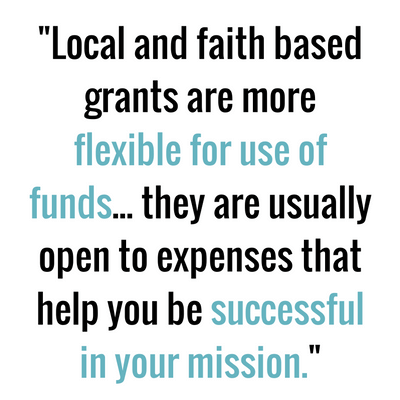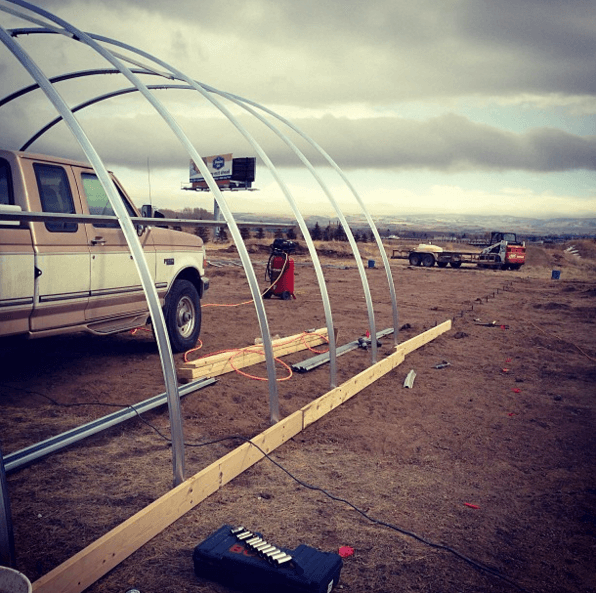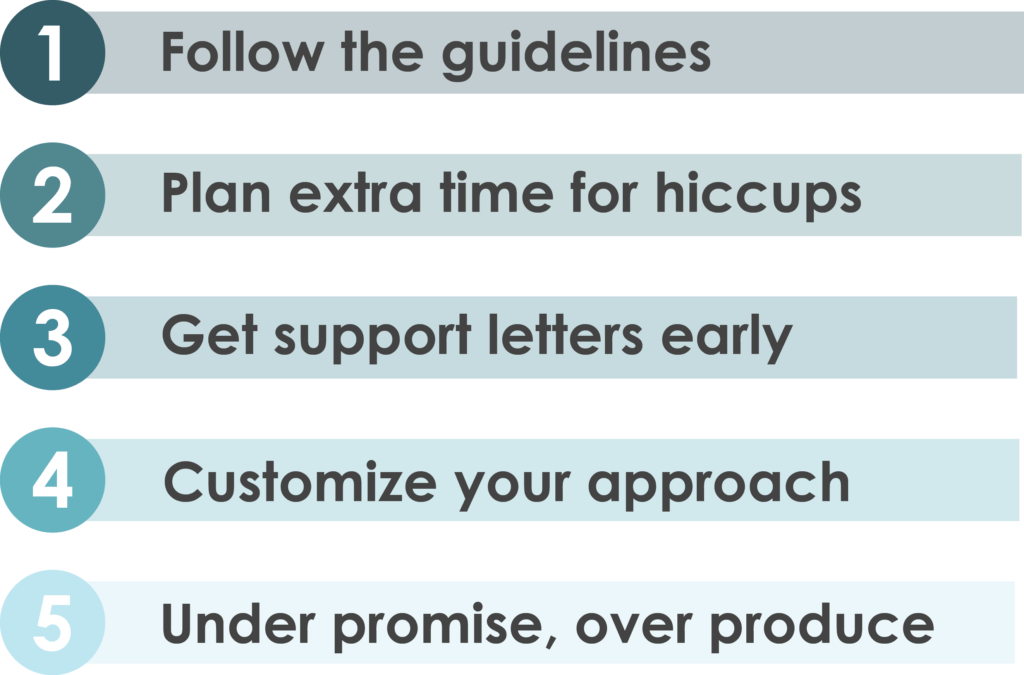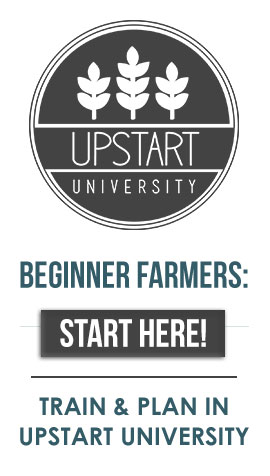Grants a top option for new small farmers
So you’re starting a farm. You have a business plan, market research, and a couple of grant possibilities. But your plans have screeched to a halt. The obstacle? Grant writing.
Grants can be a fantastic way to accomplish a mutual goal: the giving party gets to see their goals accomplished (communities empowered and served, data generated for research, specific resources promoted, etc.) and your farm gets to be the business that empowers and serves them. Governments, universities, and faith-based organizations all put out a number of grants, many of which are suitable for a small unique farm.
>>>Grants not your style? Learn about other funding opportunities in the Funding Your Farm course.
There’s just one problem. You’ve never written a grant before! Don’t panic; contrary to belief, you don’t need to take a class on grant writing to do this. Lee Speigel is an Upstart Farmer in Draper, Virginia, who received a grant for her farm, Pulaski Grow.

Lee has given us some grant writing tips to help new farmers write successful grants. Read on to get the details on:
- finding a grant
- the planning process
- and writing the grant.
Finding a grant
You can find lists of grants for farmers all over the place on the web. Different grants are directed toward farmers growing specific crops, growing for specifics markets, or with specific goals. Check out grants listed on the USDA site (there are lots of resources listed here—another great place for new farmers is this page) to start, and keep your ears open while you network to find local grants.
(Pssst… know of a great grant? Leave its name or a link in the comments!)
Community is also an important part of finding opportunities. Lee says, “I find my grants through internet searches and word of mouth. I have volunteers that share grants that they have heard about through the local university, churches, and local chit-chat.”
Finding the right grant
 Say you have a list of potential grants. Matching your farm to the right grant is important. Many grants require specific processes or participation and feedback from farmers, and you must know what you can commit to before taking grant money. So how should you choose?
Say you have a list of potential grants. Matching your farm to the right grant is important. Many grants require specific processes or participation and feedback from farmers, and you must know what you can commit to before taking grant money. So how should you choose?
Having a plan is key. The more thoroughly you’ve planned—from your business plan to financial statements and greenhouse specifics—the more you will know about what you can and cannot do!
“Each grant is unique and differs in allowable use of funds. Some will only pay for program materials, some will allow for overhead expenses and others will not, and some will focus on infrastructure while others won’t allow any of that.
Overall, I have used funds to purchase [ZipGrow Towers], fertilizer, fish and fish food, printing supplies, computers, mulch, seeds, building and plumbing supplies and some for salaries. I have found that local and faith-based grants are more flexible for use of funds. If they choose to support your program, they are usually open to expenses that help you be successful in your mission.”
Another key detail is how much money you need. Are you funding an expansion? A full build? Get as accurate as you can on quotes. Talk to equipment manufacturers and greenhouse planners.

Are you funding an expansion? A full build? Be sure to know your financial needs before choosing a grant.
By the end of this, you should know whether you need $500, $5,000, or $50,000 in grant money. Most grants will have information like the program funding, maximum grant amounts, and information on matching funds online. You can also find information on how funds can be used, the goal of the program, and other requirements online. If it’s a more obscure grant, contact the agency or organization that is providing it.
Once you’ve picked out a grant that you think you’re farm is great for, it’s time to start the writing and application process. Some grants require that you visit a local office to start applying, while others take applications online. Even if you can complete the whole process online, it’s a very good idea to talk to someone behind the grant to get their grant writing tips and improve your chances of success.
An example of a typical grant page is this Value Added Products Grants page. Note that all pertinent information about the grant is listed, as well as instructions and links for getting started.
Get more info on the grant lifecycle here.
Ready to start? Here are Lee’s 5 grant writing tips.

1) Follow all the rules from the beginning
“Always follow the RFP guidelines for writing the grant to the letter. It can seem overwhelming but just take the time at the beginning to format and set up everything correctly and it will be easy at the end.”
You can find some basic RFP (request for approval) guidelines here. The main gist is that you give grantors all the information needed to determine if your farm lines up with their goals in an orderly, concise manner. Most grantors will have their own set of RFP guidelines.
“Some grantors are more flexible than others, but don’t assume anything. If in doubt, contact the granting organization. They can’t tell you what kinds of things to write but they can clarify instructions. I read through an RFP several times before I start writing. If it is more than a page or so, I use a highlighter and those 3M page tabs to help find those sections that I will be referring back to a lot.”
As with any important document, the more pairs of eyes you get on it before it’s due the better. Have people you trust to be critical look through your writing to catch any errors that might reflect poorly on your proposal.
2) Plan for hiccups
“Look at the timeline they give you and shorten it by a week. Submit [the proposal] early so that you have time to spare if something goes wrong in the transfer…printer dies, won’t download correctly, FedEx doesn’t make it, etc.”
The due dates for proposals should be listed on informational pages. If not, be sure to check with the contact!
 3) Get support letters early on
3) Get support letters early on
While some grants don’t require letters of support, and the grant approval may not depend on them, signs of trust from other community members can add a competitive edge to your application.
“If you are going to need letters of support, ask folks for those now. You will most likely need to check back a time or two to get them back. It is embarrassing to ask a day before you need it. If you are asking a really busy person you may want to send them a sample letter for use if they would like, then they can just tweak and sign.
If you’re writing a template letter for your supporters, you can find samples and tips like these online (and maybe even some specific to the grantors).
4) Let your approach reflect the type of grant (government, university, faith-based, etc.)
“It is important to look at the type of grant you are writing for. Is it a government grant? If so, is it a research grant? If yes to both of those then you will most likely need to partner with a college or university.”
If you’re working with this type of research grant, be aware that even though the grantors may list small businesses as a target recipient, there is likely bias.
“If it is a government grant but not research driven, I would talk with your state rep or an assistant and see what they know about the grant. [Ask questions] such as:
- Are they really looking for regional partnerships, or
- Are they working with a specific portion of the population?
“Sometimes there are hidden agendas for those grants that the rest of us don’t know.”
“With most government grants they are data driven so you want to be able to use local statistics to make the case for your need. They are also sticklers for format and procedures so just be very careful following the guidelines for completing the grant.”
Other types of grants might not be so strict.
“If you are writing a local grant or faith-based grant, those are usually less strict and are driven by an understanding of the local needs. With these, I find it is really important to make the emotional connection even more than the data link (though I do that as well). [The grantors] usually have a good understanding of local issues so they want to see your passion and potential to make a positive change.”
If you’re getting into local food, then you’ll soon (if you aren’t already) be amazed at the potential a local farm can have.
You can also peek at what farmers like you are doing to connect with their communities at UpstartFarmers.com.
5) Under promise and overproduce
“Under promise and overproduce. Don’t promise really big results. Stuff happens that affects your outcomes but are beyond your control. I have had a lot of that. Better to promise modest results and make them.”
Ready to grow?
If you’ve got a grant ready, start writing. If not, then get planning!



Trackbacks/Pingbacks